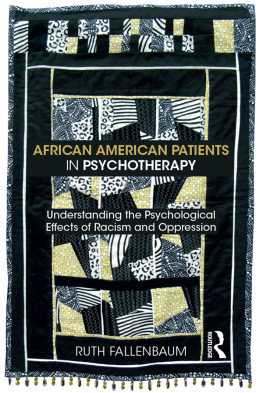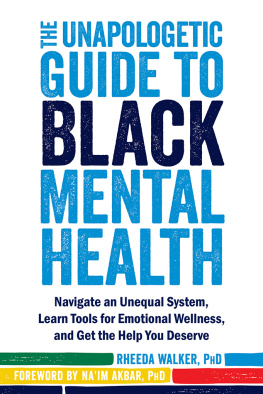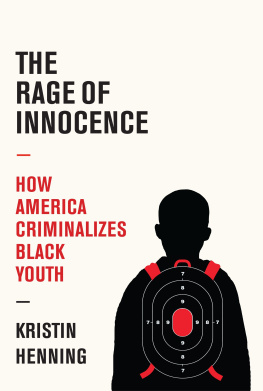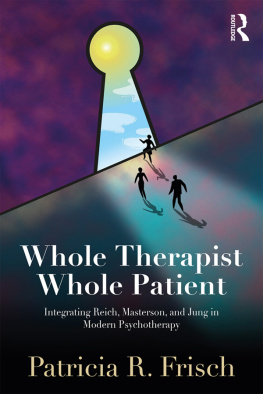
African American Patients
in Psychotherapy
African American Patients in Psychotherapy integrates history, current events, arts, psychoanalytic thinking, and case studies to provide a model for understanding the social and historical dimensions of psychological development across African American communities. Among the topics included are psychological consequences of slavery and Jim Crow, the black patient and the white therapist, the toll of even small racist enactments, the black patients uneasy relationship with health care providers, and a revisiting of the idea of black rage. Author Ruth Fallenbaum also examines the psychological potential of reparation for centuries of slave labor and legalized wage and property theft.
Ruth Fallenbaum, PhD, is a psychoanalytically oriented clinical psychologist in private practice in Berkeley, California.
African American Patients
in Psychotherapy
Understanding the Psychological
Effects of Racism and Oppression
Ruth Fallenbaum

First published 2018
by Routledge
711 Third Avenue, New York, NY 10017
and by Routledge
2 Park Square, Milton Park, Abingdon, Oxon OX14 4RN
Routledge is an imprint of the Taylor & Francis Group, an informa business
2018 Ruth Fallenbaum
The right of Ruth Fallenbaum to be identified as author of this work has been asserted by her in accordance with sections 77 and 78 of the Copyright, Designs and Patents Act 1988.
All rights reserved. No part of this book may be reprinted or reproduced or utilized in any form or by any electronic, mechanical, or other means, now known or hereafter invented, including photocopying and recording, or in any information storage or retrieval system, without permission in writing from the publishers.
Trademark notice: Product or corporate names may be trademarks or registered trademarks, and are used only for identification and explanation without intent to infringe.
Library of Congress Cataloging-in-Publication Data
Names: Fallenbaum, Ruth, author.
Title: African American patients in psychotherapy : understanding the psychological effects of racism and oppression / Ruth Fallenbaum.
Description: New York, NY : Routledge, 2018. | Includes bibliographical references.
Identifiers: LCCN 2017045343 | ISBN 9780815371373 (hardcover : alk. paper) | ISBN 9780815371380 (pbk. : alk. paper) |
ISBN 9781351181365 (e-book)
Subjects: | MESH: Psychotherapy | African Americanspsychology | Stress, Psychologicalethnology | Racismpsychology | Social Identification | Anger | United States
Classification: LCC RC480.5 | NLM WM 420 |
DDC 616.89/14008996073dc23
LC record available at https://lccn.loc.gov/2017045343
ISBN: 978-0-8153-7137-3 (hbk)
ISBN: 978-0-8153-7138-0 (pbk)
ISBN: 978-1-351-18136-5 (ebk)
Typeset in Goudy
by Keystroke, Neville Lodge, Tettenhall, Wolverhampton
To all my patients, with gratitude and respect.
Contents
From start to finish, I have been exceptionally fortunate to have had the best kind of assistance and support one could hope for. My patients have guided me to work to understand them, and each one has taught me valuable lessons about life, history, and how to practice clinical psychology. Two talented and generous friends and colleagues, Ghislaine Boulanger and Diane Ehrensaft, have put extraordinary time and thought into helping this project become a book that can hopefully be of use to fellow mental health professionals. They have read every word and provided invaluable feedback, and have helped me negotiate the publishing world with a tenacity that has made my head spin. I cannot thank them enough. I am indebted as well to two non-psychotherapist friends. Bill Issel, professor emeritus of U.S. social and cultural history at San Francisco State University, provided me with a superb reading list to better acquaint me with the historical realities of slavery and Reconstruction. Likewise, Rodger Birt, professor emeritus of humanities at San Francisco State University, gave me a very thoughtful list of readings in black literature that I doubt I would have happened upon without his help. Thank you also to consultants Laura Mason and Nadine Tang for their willingness to share their thoughts about cross-cultural research, and to Jessica Benjamin for her ideas that helped to inform the final chapter.
The warmth and enthusiasm of friends has been sustaining. They cannot imagine how important they have been to me throughout this process: Julia Gresser, Rachael Peltz, Susan Kolodny, Jackie Brookman, Jeanne Wolff Bernstein, Cynthia Carmichael, Sandra Seidlitz, Gale Bell, Kathleen Weaver, Bob Baldock, and my cousin, Julie Moskowitz. Thanks also to Tony Papanikolas for steering me towards some readings that turned out to be important in my thinking about racism in this country, and I am grateful to my long-time friend and colleague, Philip Coleman, for his insights on biracial psychotherapy.
And finally there is my husband, Zeese Papanikolas, loyal supporter and careful reader, who had a wonderful knack of dropping books on my desk that you might want to look at, and which inevitably enriched this book in so many subtle ways.
I would also like to thank Alfred Music and Hal Leonard LLC for giving me permission to reprint lyrics from the song (What Did I Do To Be So) Black And Blue:
To the Agreement dated September 15, 2017 between ALFRED PUBLISHING LLC and Ruth Fallenbaum:
(WHAT DID I DO TO BE SO) BLACK AND BLUE
Music by THOMAS FATS WALLER and HARRY BROOKS
Words by ANDY RAZAF
Copyright 1929 (Renewed) EMI MILLS MUSIC, INC., CHAPPELL & CO., INC. and RAZAF MUSIC CO.
All Rights Reserved
Used By Permission of ALFRED MUSIC
FOR OUR 33.34% CONTROL IN THE UNITED STATES and EUROPE
FOR OUR 100% CONTROL IN THE REST OF THE WORLD EXCLUDING AUSTRALIA
(What Did I Do To Be So) Black And Blue
Words by Andy Razaf
Music by Harry Brooks and Fats Waller
Copyright (c) 1929 by Chappell & Co., EMI Mills Music Inc. and Razaf Music
Copyright Renewed
All Rights for Razaf Music Administered by BMG Rights Management (US)
LLC All Rights Reserved Used by Permission
Reprinted by Permission of Hal Leonard LLC
America has not been kind to its citizens of African descent. Ever. Although adaptability, resilience, and creativity have enabled African Americans to survive the abusive and exploitive American experience into which they were forced, it is no secret that since August 1619, when the first slaves stepped ashore in Virginia, for most black Americans equal access to the success, satisfaction, or even physical safety that their country seems to offer others has been held tantalizingly out of reach. Yet through it all, African Americans persisted and contributed to every aspect of American life. The music that came out of slavery survived the Klan and the indignities of racial prejudice and has become the heart and soul, the very rhythm, of our national culture. Righting the racial injustices has been a persistent challenge for black Americans, and their struggles for liberation, along with the support at times of sympathetic whites, have provided some of U.S. historys most powerful and moving moments. Occasionally, government policy has aligned with these movements, whether for Emancipation or through the Voting Rights Act of 1964, affirmative action, or the desegregation of public schools. These policies and others represent attempts at repairing the wounds of racism as they have presented themselves in their respective eras.
Next page











